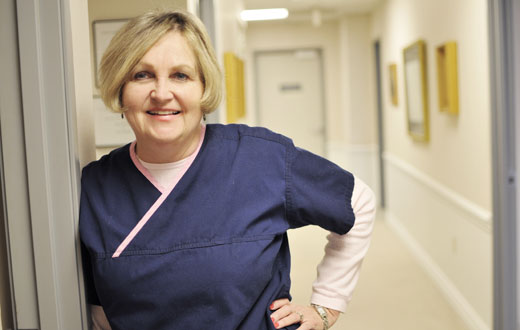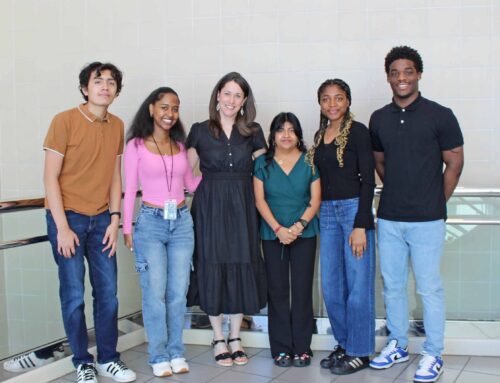Getting rid of insidious illness sometimes means losing a part of oneself, so Carol Autry’s center is helping women feel whole again
Life was good for Amy Cookman, a healthy mother in her mid-30s. She home-schooled her son while her husband worked full-time to support the family.
“2010 was turning out to be one of the best years of our lives,” Cookman says.
But it didn’t come without challenges. One has to make sacrifices when living on a single income, so the Cookmans chose to open a savings fund for medical expenses and cancel their health insurance.
But last summer, when the young wife and mother was diagnosed with breast cancer, her first thoughts were not about her health, necessarily, but about finances.
“‘You have cancer’ — that day in August when I heard those words, my first worries were, ‘this is going to devastate our family’ and ‘how are we going to afford this?’ I honestly couldn’t even think about how the cancer was going to affect me.”
Treatment would cost hundreds of thousands of dollars. “Fortunately, we found a network of doctors that believes in helping uninsured people,” she says.
The recommended treatment was a bi-lateral mastectomy — that meant losing her breasts, which she could not afford to have reconstructed, but if it meant cutting off the cancer, she says, she was willing to go through with it.
“I had no idea what life would be like without breasts, but I knew I wanted to get rid of the cancer once and for all,” she says.
Anxious and afraid, she was waiting at her surgical oncologist’s office at Baylor Hospital in East Dallas, when — by chance or fate — she met Carol Autry.
‘Somebody should do something’
Carol Autry’s mother, Doris Daniely, was a kind and generous mother and grandmother who kept her illness a secret until it was too late.
“She was the sweetest, most giving person you’d ever meet,” Autry says. “We never entirely understood why she didn’t tell us she had cancer — maybe because she didn’t want to trouble anyone. Maybe she was in denial, thinking it would go away. We still don’t really know.”
Autry, who lives in Lake Highlands and works at Baylor, grew worried after the normally attentive grandmother was too sick to attend her grandson’s college graduation. She finally took her mother to see a doctor, and it was discovered that cancer had spread through Daniely’s breast. She died two months later. Autry was sad about what happened to her mother, but she had to go on with life and with her work in the plastic surgery office of doctors Carpenter and Morales, where she encountered cancer patients almost daily.
“Patients came through all the time — mostly women who need to have a mastectomy, but who don’t have the means for reconstructive surgery afterward.”
Autry says she thought about these women constantly. All told, it costs about $100,000 for breast reconstruction surgery. A time or two, Autry says she and her coworkers had said to one another, “Somebody should do something to help them.”
“One night, I was lying in bed,” Autry recalls, “and I said to myself, ‘I am somebody.’ ”
It’s not easy to start a nonprofit, but with help from fellow Woodrow Wilson High School alumni, Autry founded the Doris Daniely Outreach for Breast Reconstruction, in honor of her mother.
Recovering with dignity
Amy Cookman’s nurse introduced her to Carol Autry, who just happened to stop by the office where Cookman was waiting to discuss her upcoming mastectomy with her doctors. Carol Autry was a godsend, Cookman says.
“Immediately, Carol made me feel at ease as she explained that the Doris Daniely Outreach was created for women just like me,” Cookman says. “Words cannot describe the relief I felt that day. Tears came to my eyes. “I secretly wanted reconstruction, but I would never want to put any more burden on my family. I felt as if my family had already sacrificed too much. The Doris Daniely Outreach was an answer to my prayers. Not only could I beat cancer, but I could do it with dignity and still feel like a woman.”
She did in fact beat cancer — “October 12, 2010,” Cookman says. She says the treatment was tough, but that she couldn’t imagine how much tougher it would have been to go through the rest of her life without breasts.
“I can only imagine how mentally devastating it would have been,” she says.
Picking up the pieces
Since organizing, the Doris Daniely Outreach has made breast reconstruction possible for 14 women.
“It might not sound like a lot,” Autry says, “but we are just taking them as we go.”
The Doris Daniely board of directors includes eight women from the neighborhood who work to raise money and awareness, and to persuade doctors and medical suppliers to donate services and parts.
“I’ve worked with [plastic surgeons] for many years. Most of them are extremely generous,” Autry says. “The doctors I work for have never said ‘no’ to a request from us.”
Doctors at Baylor have a program called The Bridge Foundation, which allows uninsured women with breast cancer to undergo mastectomies. So far, The Bridge has supplied most of the candidates for the Doris Daniely project.
“They perform the initial surgery,” Autry says, “and then we come along behind and pick up the pieces.”
The Doris Daniely Outreach relies on the generosity of donors. The organization will host a fundraiser Feb. 26 at the Dallas Arboretum from 2-5 p.m. “High tea” is $45 per person or $420 for a reserved table for 10. Purchase tickets and learn more at dorisdanielyoutreach.org.






